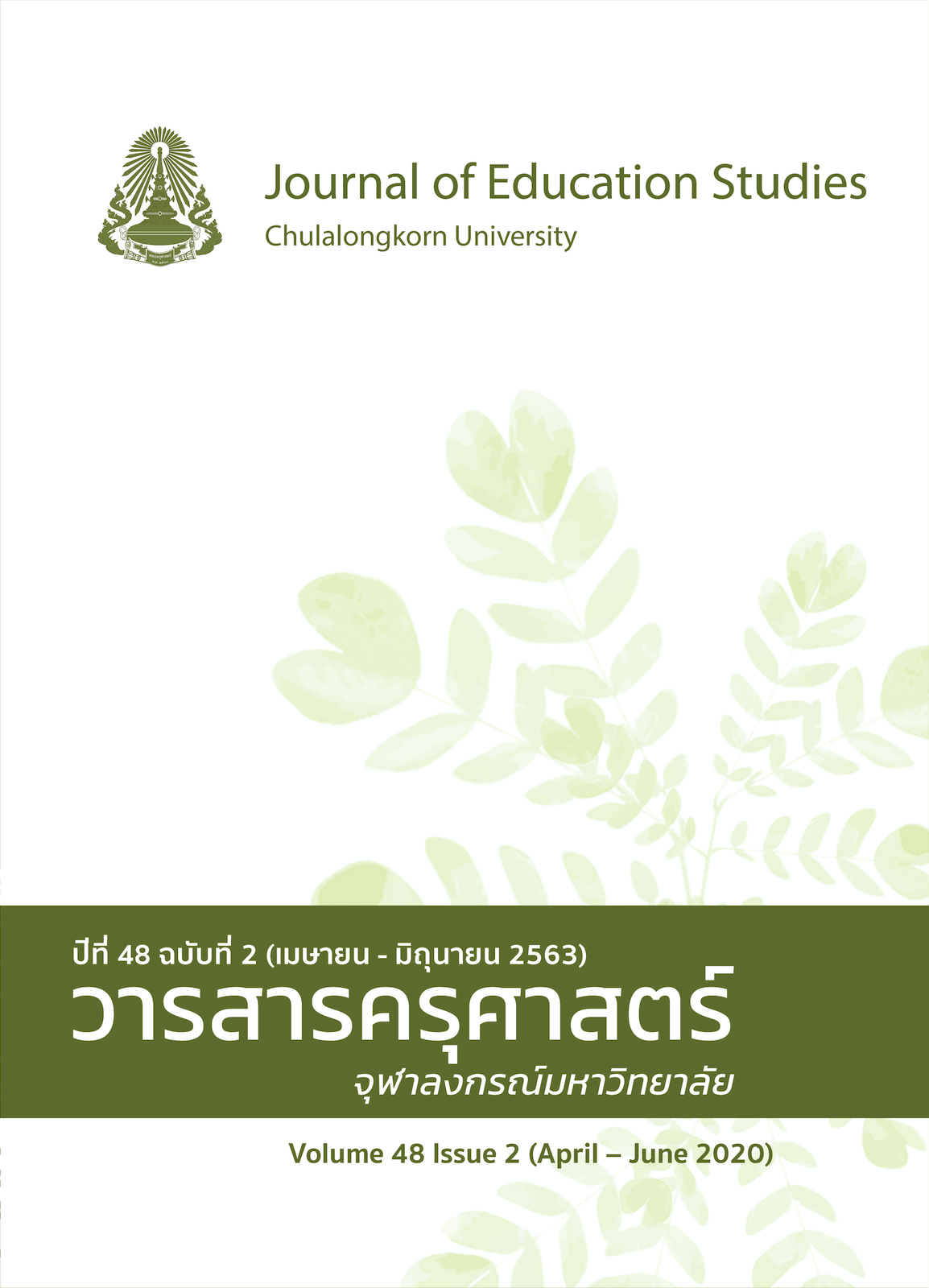Strategies for Developing Private School Administrators based on the Concept of Digital Citizenship
DOI:
https://doi.org/10.14456/educu.2020.51Keywords:
developing school administrators, digital citizenship, private schoolAbstract
The research objectives were to 1) study the conceptual framework of digital citizenship and developing school administrators to have digital citizenship; 2) study the current and the desirable states of developing private school administrators based on the concept of digital citizenship; and 3) develop strategies for developing private school administrators based on the concept of digital citizenship. The research applied a mixed method approach. The samples were 252 private schools In Bangkok under The Office of the Private Education Commission. The research instruments were questionnaires and a strategic evaluation form to test the feasibility and appropriateness of the strategies. The data were analyzed by percentages, frequency, means, standard deviations and PNI (modified). The results were as follows: 1. The conceptual framework consisted of two aspects: the concept of school management development and that of digital citizenship. 2. The current state of developing private school administrators based on the concept of digital citizenship, as a whole, was at the moderate level (M = 3.414, SD = 0.956), while the desirable state was at the high level (M = 4.147, SD = 0.741). 3. Strategies for developing private school administrators based on the concept of digital citizenship comprised three main strategies: 1) Accelerate development of private school administrators into digital citizen in terms of protecting themselves and others through the use of two substrategies and eight approaches; 2) Elevate the level of private school administrators to embrace digital citizenship in terms of their ability to educate themselves and others, inclulding the adoption of the two substrategies and eight approaches, among others; 3) Encourage school administrators’ digital citizenship in terms of respecting themselves and others, inclulding the use of the two substrategies and eight approaches.
References
กระทรวงดิจิทัลเพื่อเศรษฐกิจและสังคม. (2559, 14 ตุลาคม). เกี่ยวกับกระทรวงดิจิทัลเพื่อเศรษฐกิจและสังคม. http://www.mict.go.th/view/1/%E0%B9%80%E0%B8%81%E0%B8%B5%E0%B9%88%E0%B8%A2%E0%B8%A7%E0%B8%81%E0%B8%B1%E0%B8%9A%E0%B8%81%E0%B8%A3%E0%B8%B0%E0%B8%97%E0%B8%A3%E0%B8%A7%E0%B8%87
ครรชิต มาลัยวงค์. (2559). Digital & virtual. http://www.drkanchit.com/faq/
faq00015.html
เจษฎาภรณ์ รอบคอบ, ทศพล อารีนิจ, สุชาติ ลี้ตระกูล, และ สุวดี อุปปินใจ. (2556). ยุทธศาสตร์การพัฒนาผู้บริหารสถานศึกษาระยะเริ่มประจำการ ในโรงเรียนสังกัดสำนักงานคณะกรรมการการศึกษาขั้นพื้นฐาน. วารสารบริหารการศึกษา มศว., 10(18), 13-23.
ชาญชัย อาจินสมาจาร. (2548). การบริหารการศึกษา. ศูนย์สื่อเสริมกรุงเทพมหานคร.
เดสเลอร์, จี. (2555). A framework for human resource management [กรอบความคิดสำหรับการจัดการทรัพยากรมนุษย์]. เพียร์สัน เอ็ดดูเคชั่น อินโดไชน่า.
พฤทธิ์ ศิริบรรณพิทักษ์. (2560). รายงานการศึกษาวิจัย เรื่อง การพัฒนาแนวทางการเข้าสู่ตำแหน่งผู้อำนวยการสถานศึกษา. พริกหวานกราฟฟิค.
วัตสัน, อาร์. (2554). Future minds: How the digital age is changing our mind [เจาะความคิดชีวิตยุคดิจิตอล]. Papyrus by True Life.
วิลเฮม, เอ. จี. (2549). Digital nation [ประชาชาติยุคดิจิตอล]. เอ็กซเปอร์เนท.
วิไลพร ทวีลาภพันทอง. (2557, 25 พฤศจิกายน). สำรวจพบผู้บริหารทั่วโลก ‘ไอคิวดิจิทัลต่ำ’. http://www.forbesthailand.com/news-detail.php?did=215
อรรณพ จีนะวัฒน์. (2539). การนำเสนอโปรแกรมการพัฒนาผู้บริหารโรงเรียนมัธยมศึกษาสังกัดกรมสามัญศึกษา [วิทยานิพนธ์ปริญญาดุษฎีบัณฑิต, จุฬาลงกรณ์มหาวิทยาลัย]. http://cuir.car.chula.ac.th/handle/123456789/11984
เอกชัย กี่สุขพันธ์. (2559, 1 พฤศจิกายน). การบริหารสถานศึกษายุคดิจิทัล (School management in digital era). http://www.trueplookpanya.com/knowledge/content/52232/-edu-t2s1-t2-t2s3-
เอกวิทย์ มั่งอะนะ และ จิติมา วรรณศรี. (2559). สมรรถนะและแนวทางการพัฒนาผู้บริหารโรงเรียนมาตรฐานสากล. วารสารศึกษาศาสตร์ มหาวิทยาลัยนเรศวร, 18(2), 98-111.
ภาษาอังกฤษ
Allen, C. (2015, February 11). 9 ways to be a good digital citizen. http://blog.goguardian.com/tips-to-be-a-good-digital-citizen
Bohlander, G., & Snell, S. (2004). Managing human resources (13th ed.). Thomson South-Western.
Chand, S. (2016). Training methods: On job training and off the job training methods. http://www.yourarticlelibrary.com/employees/training-methods-on-job-training-and-off-the-job-training-methods/5421/
Gustafson, B. R. (2014). A phenomenological study of professional development in the digital age: Elementary principals’ lived experiences [Unpublished Doctoral Dissertation]. Department of Education Leadership, Faculty of Education, Bethel University.
Ivancevich, J. M., & Konopaske, R. (2013). Human resource management (12th ed.). McGraw-Hill.
Mondy, R. W., & Martocchio, J. J. (2016). Human resource management (14th ed.). Pearson Education Limited.
Park, Y. (2016, September 6). 8 digital life skills all children need – And a plan for teaching them. https://www.weforum.org/agenda/2016/09/8-digital-life-skills-all-children-need-and-a-plan-for-teaching-them/
Raheja, K. (2015). Methods of training and development. Innovative Journal of Business and Management, 4(2), 35-41.
Ribble, M. (2015). Digital citizenship in schools: Nine elements all student should know (3rd ed.). International Society for Technology in Education.
Surbhi, S. (2015). Difference between on-the-job and off-the-job training. http://keydifferences.com/difference-between-on-the-job-and-off-the-job-training.html
UNESCO. (2015). Fostering digital citizenship through safe and responsible use of ICT: A review of current status in Asia and the pacific as of December 2014. UNESCO.
Yamane, T. (1967). Statistics: an introductory analysis (2nd ed.). Harper and Row.
Downloads
Published
How to Cite
Issue
Section
License

This work is licensed under a Creative Commons Attribution-NonCommercial-NoDerivatives 4.0 International License.




